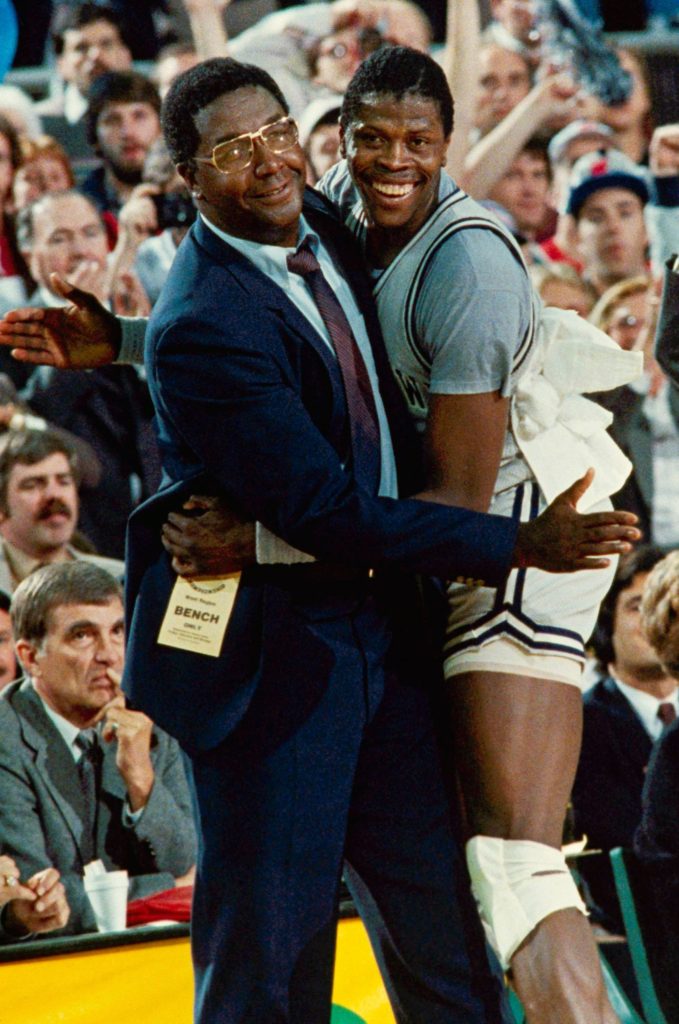Georgetown head coach John Thompson, left, gives a happy pat to the most valuable player Patrick Ewing, April 2, 1984 after Georgetown defeated the Houston Cougars, 84-75, in the NCAA playoff in Seattle’s Kingdome. (AP Photo)
John Robert Thompson Jr., the American college basketball coach for the Georgetown Hoyas Men’s team, passed away on August 30, 2020 at the age of 78.
Thompson played two seasons for the Boston Celtics after graduating from college. He most famously coached the Hoyas to victory at the NCAA Division I National Championship in 1984, making him the first black head coach to guide a team to victory in a major collegiate championship.
Nicknamed “Big John,” Thompson’s success is frequently credited as one of the major factors that led to more schools hiring African American coaches. FiveThirtyEight writes that during “the 1978-79 season, there were just seven Black head coaches, including Thompson, coaching at the Division I level outside of historically Black colleges or universities. But by 1991, after Georgetown achieved its powerhouse status, that number had jumped to 34.”
Recognized as a trailblazer in his field, Thompson was also known as a vocal advocate for the rights of minorities and as a defender of his players. He once walked off the court in 1989, protesting an initiative that would have kept academically ineligible freshman students from playing, a move that Thompson worried would wrongfully end up excluding minority students from important opportunities.
One Washington Post article from 2007 recounts an anecdote of how Thompson, upon hearing that some of his players, including the young Alonzo Mourning, had become acquainted with drug kingpin Rayful Edmond III (who was suspected to have controlled up to 60% of DC’s drug trade at the time, making him no small fry), invited Edmond into his office. There Thompson reportedly issued a warning: stay away from his players, or face consequences. Reportedly, Edmond never did bother Georgetown players again.
Thompson ultimately led the Hoyas to win nearly 600 games, and even prior to their famous 1984 victory, ESPN reports that Thompson brought the Hoyas to the NCAA championship for the first time in thirty-two years in 1975. He was also known for keeping a deflated basketball in his office, a reminder to his players not to limit themselves and to remember, according Georgetown University itself, that they would eventually need to “do something else besides play ball.”
Expressions of grief over Thompson’s death have widespread.
Allen Iverson, former pro basketball player who played with Georgetown for two years, wrote, “Thanks For Saving My Life Coach. I’m going to miss you, but I’m sure that you are looking down on us with a big smile. I would give anything just for one more phone call from you only to hear you say, ‘Hey MF’, then we would talk about everything except basketball.”
Another former Georgetown player and current coach Patrick Ewing said, “Georgetown University, the sport of basketball and the world has lost someone who I consider to be a father figure, confidant and role model…His reach went well beyond just those who he knew personally, he changed the world and helped shape the way we see it.”
Thompson was inducted into the Naismith Memorial Basketball Hall of Fame in 1999.
It would be an impossible and hopelessly reductive task to attempt to sum up the full breadth and meaning of Thompson’s legacy in a single article. However, one interview with him—as recounted by another Washington Post article—leaves an indelible impression. Once, in 1982, when asked how he felt about being the first black coach to make it into the Final Four, Thompson responded by saying: “I resent the hell out of that question…It implies that I’m the first black coach capable of making the Final Four. That’s not close to true. I’m just the first one who was given the opportunity to get here.”
Thompson spent his career fighting to give that same opportunity to others. He defended his players at school and in their personal lives as well as on the court. And in doing so, he has forever changed the landscape of professional basketball.
Thompson Interview Source
Washington Post, John Thompson and I argued plenty, but few people have taught me more: https://www.washingtonpost.com/sports/2020/08/31/john-thompson-feinstein/


